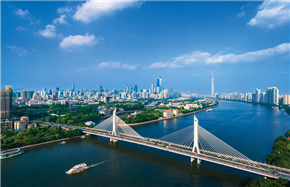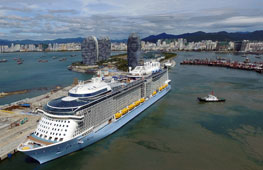Thailand speaks about cooperation with China in interview
Associate Professor Yu Haiqiu Deputy Director Institute of Thailand Studies Yunnan Academy of Social Sciences Chinese Academy of South and Southeast Asian Studies (Kunming)
Interviews with Prof. Dr. Suthiphand Chirathivat
Director ASEAN Study Center,
Chulalongkorn University
On the sideline of the 5th China-South and Southeast Asian Think Tanks Forum held in Kunming on 13th of June, 2017, Miss Yu Haiqiu, deputy director of the Chinese Academy of South and Southeast Asian Studies (Kunming) conducted an in-depth academic interview with Prof. Suthiphand Chirathivat , director of the ASEAN Studies Center at Chulalonkorn University, a top think tank in Thailand, on the construction of the China-Indochina Peninsula Economic Corridor and the advancement of Yunnan-Thailand cooperation.
Yu Haiqiu: The Belt and Road Forum for International Cooperation held last month in Beijing attracted world-wide attention. At the forum the construction of the China-Indochina Peninsula Economic Corridor was repeatedly highlighted. What have been the responses on the part of Thailand to that?
Suthiphand: China's Belt and Road initiated by president Xi Jinping has been positively embraced in Thailand. Despite the fact that Prime Minister Prayuth failed to attend the forum, the Thai Government has made it clear on various occasions that there is much agreement among the government, the industries and the academia that Thailand stands ready to be actively engaged in the Belt and Road to take a free riding on China's rapid economic development.
The core of Thailand 4.0 put forward by the Thai government is highly coincident with China's Belt and Road initiative, both with an aim to upgrade industrial structures by innovation, optimize factorial distribution by infrastructure elevation and incorporate into regionalization and globalization by further opening up to the rest of the world. In its economic transformation, Thailand alone will not be able to cope with the problems faced by Thailand, problems such as population aging, drop in competiveness of labor-intensive industries, underinvestment in infrastructure and insufficient supply of human resources in high and new technologies. As part of the Belt and Road, the construction of the China-Indochina Peninsula Economic Corridor is a strategic opportunity for Thailand to break the bottlenecks constraining its economic development by taking advantage of China's capital, markets and technologies.
Yu Haiqiu: What's yet to be done by China and Thailand to build this economic corridor?
Suthiphand: At the moment, China and Thailand could unfold cooperation with a focus on the following:
First, work must be done to foster closer ties between the think tanks on both sides to enable the respective government to coordinate relevant policies. There is no doubt that both governments are set for to cooperation, yet specific work needs to be done by think tanks to help the governments formulate practical policies, acquire necessary expertise and raise professionalism. All these are needed to ensure the construction of the economic corridor in a pragmatic, flexible and professional way. That mostly is the job of the think tanks on both sides working together.
Second, efforts must be made to let the Thai people learn more about the positive effects of China's Belt and Road on Thailand's development. Now unfortunately, Belt and Road is staying mainly with government officials, industrial leaders and intellectual elite in Thailand, with the larger population knowing very little about its means and ends, which renders those people prone to suspicion and misunderstanding of the initiative. Therefore, publicity campaign in various popular forms must be put in action to make the significance, necessity and feasibility of the economic corridor better known to the people along the corridor to solicit their recognition and draw their participation.
Third, projects must be given long-term planning and complete implementation, especially when it comes to mega projects like the Sino-Thai railway that have a demonstrative effect on forthcoming ones. The twists and turns of the Sino-Thai railway cooperation is largely attributable to the evaluation of its cost –effectiveness by different social groups in Thailand. Admittedly, the railway is not currently cost-effective given the population density and the income level in Northeastern Thailand. However, approaching it from a dynamic vision and in a broader perspective, you would see the role the railway will play in integrating the resources along the way, thus activating the potential for development in such sectors as tourism, medical services, logistics, e-commerce and industrial zone in China's southwest, the Laos and Northeastern Thailand. Therefore, it is important to conduct further feasibility studies and make a longer-term plan of the railway to make it more radioactive and productive.
Fourth,information sharing must be guaranteed to make it easier for enterprises to take part in the construction of the economic corridor. Various players are needed in the process of Belt and Road advancement, with enterprises being the most pivotal. We have to admit that Chinese enterprises, especially small and medium enterprises, are not quite familiar with conditions of Indochina countries, conditions ranging from languages, customs to legal systems and administrative styles. Information sharing would enable these enterprises to quickly adapt to the local environment and start operation with a reasonable understanding of the laws and rules in the hosting countries so as to keep risks to their lowest rate. With this point in view, cross-border joint actions must be taken to provide needed information to enterprises that have a stake in the construction of the economic corridor.
Yu Haiqiu: What insights do you have to share with us regarding how to deepen Yunnan-Thailand cooperation?
Suthiphand: Yunnan is China's gateway to Thailand and its geographical and cultural advantages are apparent to be noted. To deepen cooperation between Yunnan and Thailand, I think we can focus on the following:
First, we need to create institutions and networks to better coordinate our respective policies. As the gateway to Thailand, Yunnan is the most sensitive to new challenges and opportunities arising from its cooperation with its neighbors. In this sense, Think tanks in Yunnan are best positioned to have access to first-hand information that could serve as facts for the central government to formulate policies that are reasonable and actionable for Yunnan-Thailand cooperation. The Chinese Academy of South and Southeast Asian Studies (Kunming) has done a great job in this regard as is demonstrated by the inspiring proposals put forth by President He Zukun of the academy. What is to be done next is to put the cooperation between the think tanks on both sides on an institutional and regular basis.
Second, we need to make better use of the mobile internet to tighten the cultural ties. Yunnan and Indochina countries share identical cultural roots, making people-to-people communication much easier than elsewhere in China. Now that the mobile internet technology is growing rapidly in the Indochina countries, and the number of mobile internet users is on the rise, particularly among the younger generations who, in a digital world, would better understand Yunnan's culture and China's initiatives.
Third, governments at different levels in China need to regulate the behavior of Chinese migrants to Indochina countries. Recent years have witnessed a sharp increase of Chinese migrants to Indochina countries and large number of them is from Yunnan. These migrants, while making contributions to the deepened Yunnan-Thailand cooperation, have, to some extent, left a negative image on the local people. To reverse the situation, they must be told to be properly adaptive to the local communities and to take on more social responsibilities and play the role of capillaries in establishing a positive image that is reprehensive of Yunnan and China as a whole.














